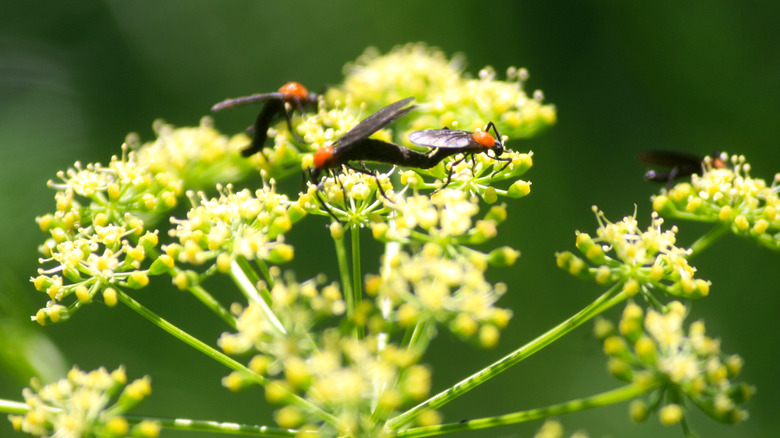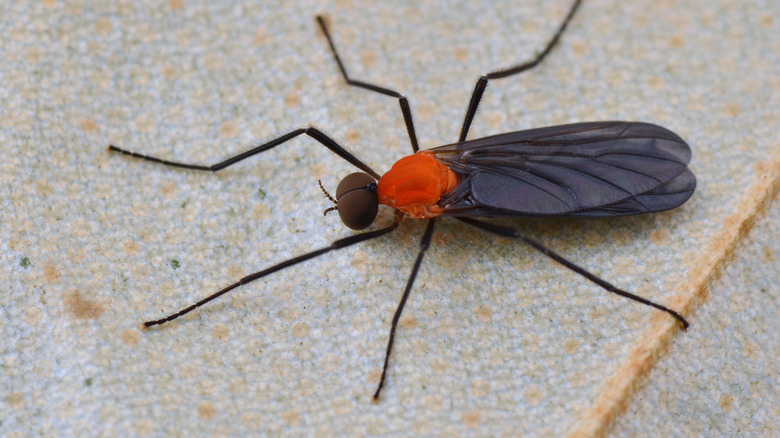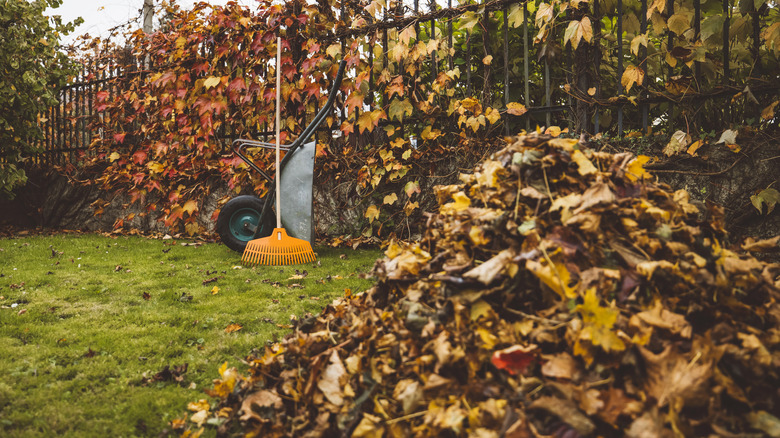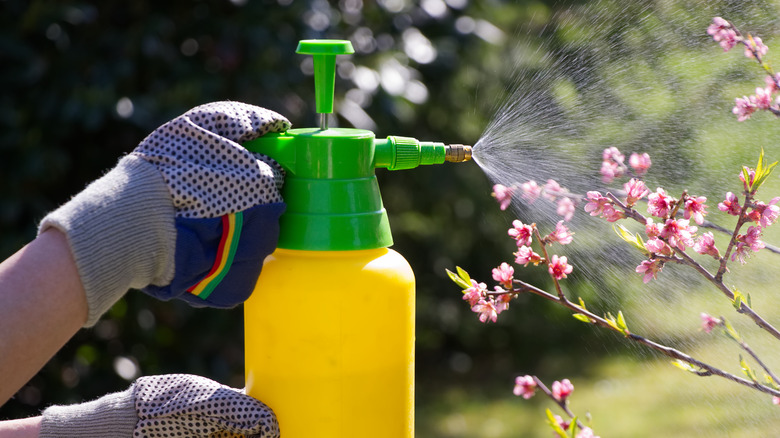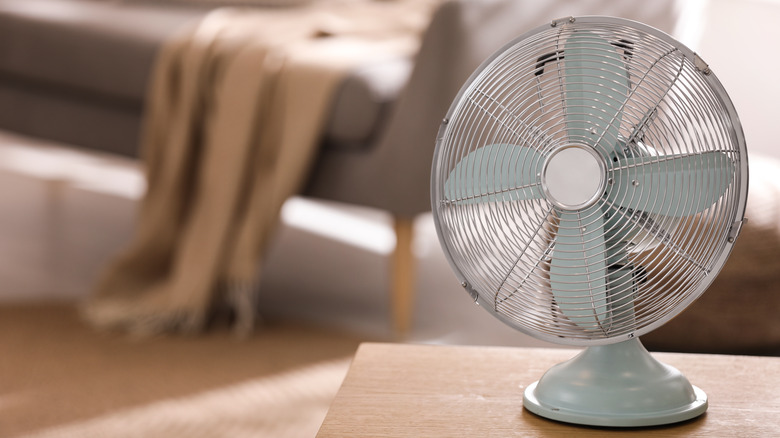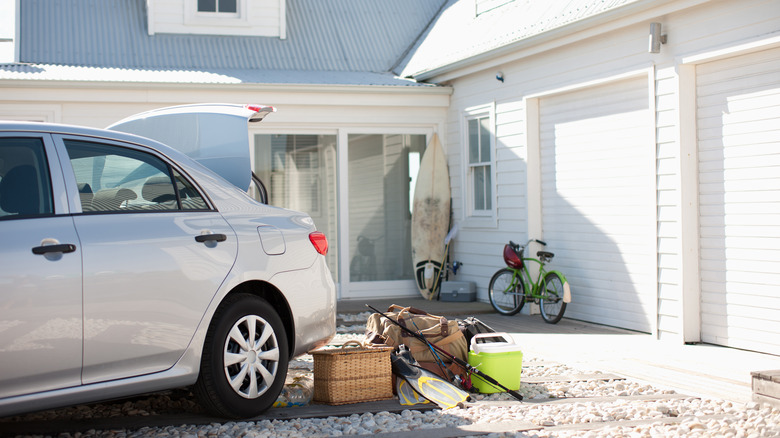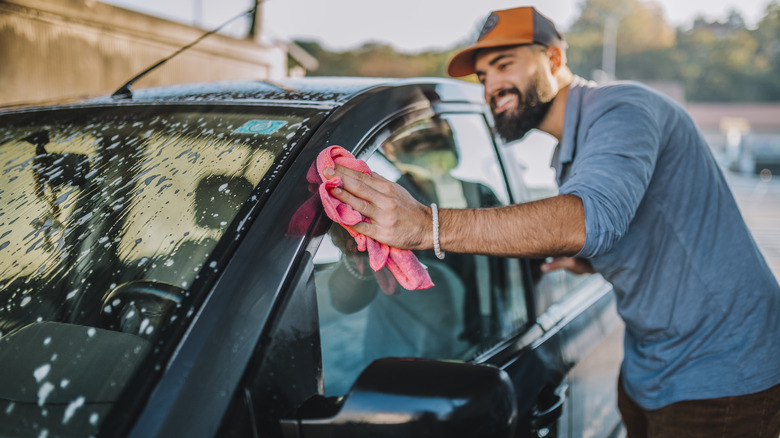Keep Love Bugs Out Of Your Home With These Tips
Love bugs may sound pretty, but as anyone who has suffered a swarm of these irksome pests in their home knows, things can get ugly and fast when they're around. Classified as March flies, the airborne insects are easily identifiable due to their red heads and black bodies. Also known as the honeymoon fly, the kissing bug, and the double-headed bug, love bugs are so-called because the male and female of the species are frequently seen stuck together in a tail-to-tail mating ritual. They tend to swarm and invade the sanctity of our home like a noisy and nosy neighbor at the barbecue.
However, love bugs have their place and purpose under the sun. Lovebug larvae feed on decaying plants and dead vegetation. They convert it into an organic and nutritional matter called humus that enriches and enlivens the soil and feeds the plants. However, like all flies, love bugs can be a nuisance, and you don't want thousands of the little blighters setting up camp in your home. You'll never control a love bug problem completely during peak season, but with these tips, you can make it a lot more manageable and prevent them from becoming established.
When is love bug season?
Love bugs are predominantly found on the Gulf Coast and are particularly fond of Florida, South Carolina, and Georgia. There is a wide-reaching conspiracy theory that the distinctive insects were genetically engineered to help combat the threat of mosquitos. That theory has since been debunked. Love bugs are believed to have originated in South America and were first identified as a species in their own right in 1940 when they were found in eastern Texas. These beady-eye fellas spend a lot of the year in the soil as larvae, but come the spring and late summer, they emerge as adults to mate, and this is when the problems begin. Males will swarm together looking for a female swarm, and when the two collide, they go at it hell for leather.
Many Floridians describe their seasons as summer, hurricane, and love bug season because of how rampant they are. Big gangs of them leisurely swarm around, copulating furiously and creating trouble for motorists everywhere. Although love bugs are pretty harmless in that they don't bite or carry disease, they love the scent of gasoline. You'll often find them hanging around highways in large numbers before they become roadkill on windshields. They are also attracted to the flowers in your yard and the humid areas of your home, such as basements and attics. Let's find out how to keep them out.
Keep your lawn manicured
Everyone enjoys frolicking through the long grass as the butterflies dance and the bees buzz. Yet, in all that lush and moist vegetation, there lies a problem. Your unkempt lawn naturally appeals to insects of all shapes and sizes. The tall grass provides a natural shelter for love bugs to make out and breed. Their larvae positively thrive in all that dense greenery. Long grass is a natural haven for insects such as love bugs, beetles, caterpillars, moths, and butterflies. Which in turn attracts birds and hedgehogs. So if you want your yard to be wildlife friendly, why not consider a compromise?
By keeping a patch of long grass in the corner or boundary of your yard, you can still keep the rest of your lawn immaculate and well-kept as a bowling green. Sure, the long grass will still attract love bugs, but nowhere near as many.
Stay on top of your garden waste
After you've finished mowing, trimming, breaking a sweat, and busting a gut, ensure all the dead grass is disposed of properly. If you pile it out of the way somewhere, the love bugs will know and lay their eggs in the clippings. During the mating season, a female is capable of laying 100 to 350 eggs in any organic waste you might have lying around your yard. So alongside the dead grass, clear up any rotting leaves or abandoned plants that could be lying around.
Log piles may look quaint, but ask yourself, are they an open invitation to love bugs? Likewise, compost heaps are a great way of recycling kitchen and garden waste, but they have a habit of attracting all manner of insects, particularly love bugs. Ponds and swampy areas are also extremely attractive to these water-loving insects, who see them as the perfect egg-laying environment. To keep your yard and house a love bug-free zone, it's wise to stay on top of your garden waste and keep your yard in order.
Drug the bug with some insect spray
If all else fails and the love bugs have begun to colonize your yard, you'll need to take divisive action, and that could include chemical warfare. Bithor bug spray is a reliable option to keep bugs at bay. Identify the area of your yard you suspect the bugs may use as a breeding ground and spray the dirt and plants. Bithor kills adult love bugs and will prevent any eggs they have already laid from hatching.
Mix five gallons of water with 2.5 oz of Bithor, and you'll have enough to cover 1,000 sq/ft of yardage. Spray the solution with a hose for the best effect. This solution is a toxic substance to fish and aquatic life, so please ensure the spray doesn't run off into any nearby water sources, such as ponds, ditches, or drains. Additionally, do not use it in the rain or allow pets or people on any surfaces you have sprayed until they have dried.
Use a homemade deterrent
Chemicals are not everyone's cup of tea, so if you want to take on the love bugs el natural, why not make a homemade deterrent? All you need is a little citrus-scented dish soap mixed with water, and you're good to go. Like mosquitos, love bugs hate the smell of lemons and will go out of their way to avoid it. Although love bugs only live for about three to four days, there's no need to put an end to their fun and kill them if you don't have to.
Take one empty spray bottle, fill it with water, and add a sprinkle of citrus-scented soap. A few drops should suffice. For a little minty aroma, you can add a dash of mouthwash, but the choice is yours. Mix the brew until potent and spray on your plants and throughout your yard at least once a day throughout love bug season. The great thing about using a homemade bug deterrent is you can use it inside your home and out without the threat of any harmful side effects. If you wanted to, you could even spray it on your skin to ensure the bugs keep their distance.
Blow the bugs to kingdom come with a fan
Copulating and breeding may be their forte, but love bugs are lacking somewhat in the aerial mastery department. These winged Romeo and Juliets mate during flight, and their romantic rendezvous can take anywhere up to 12 hours. These little bugs definitely have a lot of love to give. However, a female's work is never done, and after the mating ritual, the lady love bug lays between 100 and 350 eggs over four days before she dies. If you can prevent the females from landing in your yard and laying those eggs, the battle is won. And fans could just be the solution you're looking for.
The air currents a standing or ceiling fan can generate should be enough to disorient the love bugs and blow them right off track. The fast-moving air will be too much for the love bugs to contend with, particularly while locked in an amorous embrace, and they'll take themselves to more secluded spots where they can get it on in peace.
Don't leave your motor running
Love bugs have a thing for Volkswagen Beetles. In fact, they have a lot of love for any automobile as long as the engine's running and it's spitting out gas fumes. The exhaust fumes react with summer's natural ultraviolet radiation to create a scent that reminds the love bugs of decaying vegetation, which is their preferred environment to lay their eggs.
University of Florida Professor Dr. Norman Leppla told ClickOrlando.com that in the 1970s, love bugs were such a problem on the state's highways "you had to pull off the road every 30 minutes or sooner." He added, "They were so abundant they would cover the windshield and that is when we got on the turnpike these windshield wash stations. People literally lined up with their vehicles, trucks included, and they had to go through and clean their windshield, or they couldn't see." During love bug season, it is never wise to leave your motor running in the drive, or else a random and rogue insect swarm catches a scent of something sweet downwind and comes calling.
Avoid daytime barbecues
There's nothing quite like a sizzling steak or a crisping chicken wing to let everyone know summer has arrived with a capital S. Yet all the heat, smoke, and scents generated by a barbecue also have a habit of attracting insects such as mosquitos, hornets, ticks, ants, and love bugs. There are all manner of ways you can keep the insects away from your barbecue and cook up a plate of pork in peace on a lazy summer's afternoon. Placing slices of lemon and cloves of garlic near the grill is a good trick. As is lighting a few citronella candles and planting a few insect-repellant plants such as lavender and chrysanthemum. However, when it comes to keeping love bugs from invading your barbecue, one surefire way to keep your barbecue bug free is to wait until after 5 pm.
Just like Dolly Parton, love bugs believe in working 9-5. Their peak period of activity is between these hours. When the sun sinks, they retire to wherever love bugs go. As a plus point, they are not attracted to electric lights like many insects. So if you're thinking of cooking something juicy and having a party this summer, avoid daytime barbecues if the love bugs are prowling.
Wax your car
One of the biggest threats love bugs pose is to your car. During the mating season, your vehicle is a magnet for these winged petrol heads. They tend to travel up the highways and byways of life and turn the front of your car into a hot mess of dead insects. During love bug season, this can be pretty unavoidable. Here's the bad news! If you don't wash the dead bugs off within 24 hours, the acid their decomposing bodies generate can burn and damage the paint and plastic on your car. It gets worse. Patti Fowle of Naples Car Wash explained to The Herald-Tribune, "They can clog your radiator and cause your engine to overheat. The smell of them cycles through your car. We use special chemicals with high-pressure water to get them off safely. If really bad, we will use brushes as a last resort."
Obviously, you do not want to let things escalate to this point. You can get ahead of the curve by washing and waxing your vehicle diligently before love bug season begins. The wax will provide an added layer of protection between your car's paint and the love bug's gut acid. This gives you more of a window outside the 24-hour timeframe to remove the bugs before the damage is done. Wax your car continually throughout the season to stay one step ahead of the bugs.
Don't decorate until love bug season ends
Love bugs adore bright colors and have a special place in their little insect hearts for the color white. They also gravitate towards freshly painted surfaces. So if you're thinking of painting your walls white during love bug season, forget about it. University of Florida professor Dr. Norman Leppla specializes in integrated pest management and biological control, and told ClickOrlando.com that since light colors draw love bugs in, it's wise to avoid having light-colored walls during peak season.
Professor Leppla even went as far as to suggest that it may be prudent to avoid wearing light-colored clothing to keep the bugs at arm's length. Dressing like Johnny Cash has its appeal, but putting off the decorating until summer ends sounds even better. So put the paintbrush down, pour yourself a glass of something chilled, and play the waiting game!
